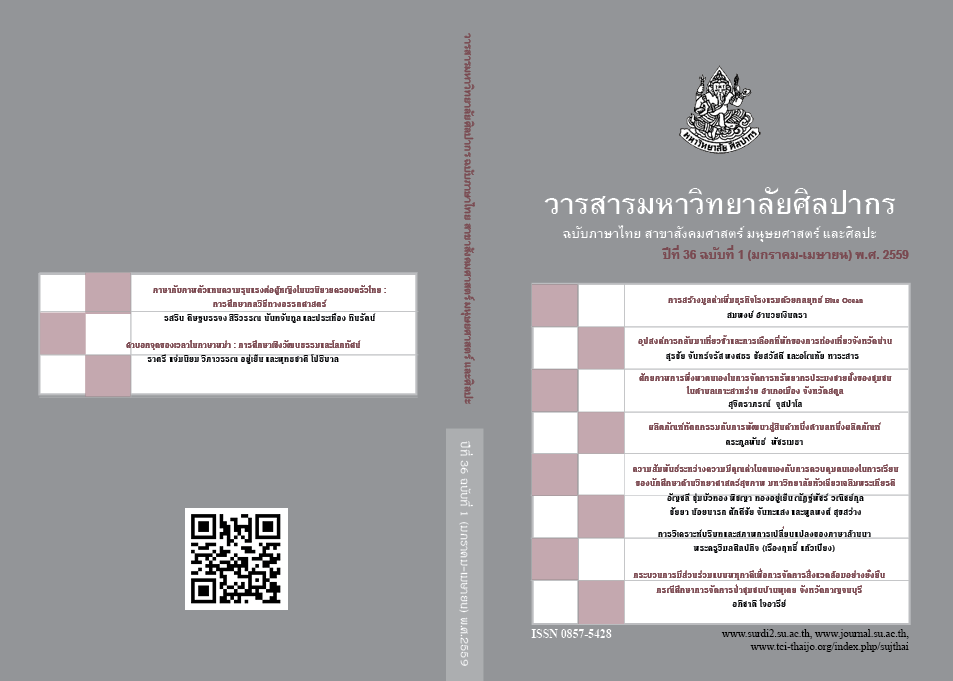การสร้างมูลค่าเพิ่มธุรกิจโรงแรมด้วยกลยุทธ์ Blue Ocean (Value Added Creation in Hotel Business with Blue Ocean Strategy)
Main Article Content
Abstract
ปัจจุบันผู้ประกอบการโรงแรมขนาดเล็กในประเทศไทยเผชิญการแข่งขันรุนแรงมากขึ้นทั้งจากธุรกิจเซอร์วิสอพาร์ตเมนต์ที่ให้บริการห้องพักรายวันในราคาที่ต่ำกว่า และโรงแรมในเครือต่างประเทศที่มีความเชี่ยวชาญด้านกลยุทธ์การตลาดได้ขยายธุรกิจมาทำตลาดโรงแรม 3 ดาวในพื้นที่ท่องเที่ยวมากขึ้น รวมทั้งผู้ประกอบการรายใหม่จำนวนมากขึ้นเพื่อรองรับการเข้าสู่ประชาคมเศรษฐกิจอาเซียน ดังนั้นการปรับตัวเพื่อความอยู่รอดและเสริมสร้างศักยภาพการแข่งขันจึงเป็นสิ่งจำเป็นอย่างยิ่งสำหรับผู้ประกอบการธุรกิจโรงแรม บทความนี้มีวัตถุประสงค์เพื่อค้นหาแนวทางพัฒนาศักยภาพการแข่งขันสำหรับธุรกิจโรงแรมขนาดเล็กในประเทศไทยที่แสวงหาโอกาสทางธุรกิจ โดยประยุกต์แนวคิด ‘นวัตกรรมเชิงคุณค่า’ ของกลยุทธ์ Blue Ocean แทนที่มุ่งเอาชนะคู่แข่งขัน แต่กลับให้ความสำคัญกับการเพิ่มคุณค่าโดยเฉพาะทางด้านจิตใจและลดต้นทุนการดำเนินงาน มาประยุกต์ใช้ในธุรกิจโรงแรมด้วยการออกแบบบรรยากาศในโรงแรมให้มีเอกลักษณ์เฉพาะตัว ผสมกลมกลืนกับสภาพภูมิประเทศและวิถีชีวิตของชุมชนในพื้นที่ โดยมีตัวตนแท้จริงของแบรนด์สินค้าเพื่อตอบสนองความต้องการของลูกค้าเฉพาะกลุ่มที่แสวงหาประสบการณ์ใหม่ในการเดินทาง และความรู้สึกพิเศษที่มีต่อสถานที่ บทความได้วิเคราะห์แนวทางและเครื่องมือวิเคราะห์กลยุทธ์ Blue Ocean โดยผ่านกรณีศึกษา 2 โรงแรมขนาดเล็กในประเทศไทยที่ประสบผลสำเร็จในการสร้างมูลค่าเพิ่ม ได้แก่ บ้านนอนเพลิน และหินตกริเวอร์ แคมป์
Downloads
Article Details
References
Charoenphon, V. (2011). Oversupply of Accommodation a Serious Problem: Why...and Solution? SCB Economic Intelligence Center (ปัญหาห้องพักโรงแรมล้นตลาด ทำไม...และมีแนวทางแก้ไขอย่างไร). [Online]. RetrievedDecember 2, 2014 from https://www.scbeic.com/THA/document/note_20111220_hotel/.
Chathoth, P. K. and Olsen, M. D. (2003). Strategic Alliances: A Hospitality IndustryPerspective. International Journal of Hospitality Management, 22(4): 419-434.
Decharin, P. (2008). Strategic Innovation (นวัตกรรมทางกลยุทธ์). Chulalongkorn Business Review, 30(117-118): 115-125.
Department of Business Development, Ministry of Commerce. (2010). A Study of Current Status and Com-petitiveness of Hotel Business in Thailand (การศึกษาสถานภาพและความสามารถในการแข่งขันของธุรกิจ โรงแรมในประเทศไทย). [Online]. Retrieved December 2, 2014 from https://www.caii-thailand.com/sites/default/files/downloads/Hotel.pdf
Dwyer, L., Edwards, D., Mistilis, N., Roman, C., and Scott, N. (2009). Destination and Enterprise Management for a Tourism Future. Tourism Management, 30(1): 63-74.
Geddie, M.W., DeFranco, A. L. and Geddie, M. F. (2005). A Comparison of Relationship Marketing and Guanxi: Its Implications for the Hospitality Industry. International Journal of Contemporary Hospitality Management, 17(7): 614-632
Gupta, S. and Lehmann, D. R. (2005). Managing Customers as Investments: The Strategic Value of Customers in the Long Run. Upper SaddleRiver, NJ, USA: Wharton School Publishing.
Hanpipat, Phacharuemon., Managing Director, Baan Norn Plearn, (2015, June 3). Interview.
Jittrakhamthai, S. (2014, July). Heroes of Philanthropy: Arrut Navaraj: FromChemical Engineer to Organic Gardener (อรุษ นวราช: จากวิศวกรเคมีสู่เกษตรกรอินทรีย์). Forbes Thailand, 2: 114-117.
Kim, W. C. and Mauborgne, R. (2005a). Blue Ocean Strategy: How to Create Uncontested Market Space and Make the Competition Irrelevant. Boston, MA: Harvard Business School Press.
Kim, W.C. and Mauborgne, R. (2005b). Blue Ocean Strategy: From Theory to Practice. California Management Review, 47(3): 103-121.
Kumboon, B. and Vongsansi, P. (2010). Development of Home Bakery Business of Suan Dusit Rajabhat University with the Blue Ocean Strategy (การพัฒนาธุรกิจโฮมเบเกอรี่มหาวิทยาลัยราชภัฏสวนดุสิต ด้วยกลยุทธ์ Blue Ocean). SDU Research Journal: Humanities and Social Sciences, 6(1): 66-81.
Leavy, B. (2005). Value pioneering – How to Discover Your Own “Blue Ocean”: Interview with W. Chan Kim and Renée Mauborgne. Strategy & Leadership, 33(6): 13-20.
Line, N. D and Runyan, R. (2012). Hospitality Marketing Research: Recent Trendsand Future Directions. Inter-national Journal of Hospitality Management, 31(2): 477-488.
Lo, A. S., Stalcup, L. D. and Lee, A. (2010). Customer Relationship Management for Hotels in Hong Kong. In-ternational Journal of Contemporary Hospitality Management, 22(2): 139-159.
Manager 3600 Weekly. (January 5, 2012). Big fight 2012: Hotels VS Serviced Apartments (ศึกใหญ่ปี 2555 ‘โรงแรม’ VS ‘เซอร์วิสฯ’). [Online]. RetrievedNovember 21, 2014 from https://www.manager.co.th/mgrweekly/viewnews.aspx?NewsID=9550000001623
Otakanon, B. (2008). Blue Ocean Strategy and Farm Chokchai (Blue OceanStrategy กับฟาร์มโชคชัย). Strat-egy+Marketing (S+M), 7(82): 122-123. [Online]. Retrieved November 21, 2014 from https://inside.cm.mahidol.ac.th/mkt/index.php?option=com_content&view=article&id=134:blue-ocean-&catid=1:mk-articles&Itemid=11
Parvinen, P., Aspara,J., Heitanen, J., and Kajalo, S. (2011). Awareness, Action and Context-Specificity of Blue Ocean Strategies in Sales Management.Management Decision, 49(8): 1218-1234.
Prompes, P. (2011). Blue Ocean Strategy and the Truth in Business (Blue OceanStrategy กับความเป็นจริงในโลกธุรกิจ). RMUTI Journal, 4(2): 15-28.
Ratanaphruks, K.(2012). Heritage accommodation in Bangkok: Developmentand Importance of Culture. Veridian E-Journal, Silpakorn University, 5(2): 1-18.
Reid, L. J., Smith, S. L. J. and McCloskey, R.(2008). The Effectiveness of Regional Marketing Alliances: A Case Study of the Atlantic CanadaTourism Partnership 2000-2006. Tourism Management, 29(3): 581-593.
Sheehan, N. and Vaidyanathan, G. (2009). Using a Value Creation Compass to Discover “Blue Oceans”. Strategy & Leadership, 37(2): 13-20.
Soorangura, S., Managing Director of Serenata Hotels and Resorts. Personal communication (2013, June 22). Interview.
Thiangtam, S. (2011). Blue Ocean Strategy (กลยุทธ์ทะเลสีคราม). Executive Journal, 31(2): 15-20
Thinking outside the Hotel Box: Blue Ocean Strategies for Hotels in Taiwan.(2012). Strategic Direction, 28(10): 9 – 11.
Tucker, H. and Lynch, P. (2005). Host-guest Dating: The Potential of Improving the Customer Experience through Host-guest Psychological Matching. Journal of Quality Assurance in Hospitality and Tourism, 5(2-4): 11-32.
Yang, C. C. and Yang, K.J. (2011). An Integrated Model of Value Creation Basedon the Refined Kano’s Model and the Blue Ocean Strategy. Total Quality Management, 22(9): 925–940.
Yang, J. T. (2012). Identifying the Attributes of Blue Ocean Strategies in Hospitality.International Journal of Contemporary Hospitality Management, 24(5): 701-720.


